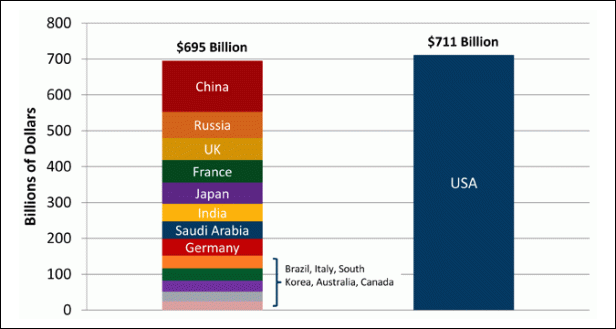Iranian frigate Sahand burns after being attacked by the U.S. in the Persian Gulf on April 18, 1988. The Sahand was reportedly heading toward US maritime borders last week.
Videos by Rare
On Saturday, the IRNA – Iran’s official news agency – reported that Iranian warships had circled South Africa and were heading towards the United States. A U.S. defense official has expressed doubt that the Islamic Republic’s ships will actually approach American waters and naval experts have called the inbound vessels “rust buckets.”
Yet Iran’s statement remains: A combative gesture was made by a nation that has a contentious relationship with the U.S.
When foreign governments make these kinds of audacious threats, they are reliably exploited by American hawks, eager for intervention.
But to whatever extent we should be concerned about threats like Iran’s, they also reinforce the practical necessity of weighing our true national security against the pitfalls of hasty military action. These episodes underscore the need for a foreign policy that prioritizes national defense above babysitting the planet.
Iran’s saber rattling reminds us of the need for a foreign policy like Senator Rand Paul’s.
Consider the similar – and arguably more serious – threats made by North Korea over a year ago. In December 2012, North Korea successfully tested its long-range Unha rocket: a weapon that could, in theory, strike anywhere in California. In the following months, the hermit state lobbed almost comically grave threats across the Pacific, promising a “preemptive nuclear attack against the headquarters of the aggressor” that would be “merciless.”
In March 2013, President Obama responded to these threats by ordering the installation of missile interceptors in Alaska. They should be ready by 2017.
George W. Bush, as it happens, also placed an order for missile interceptors in Alaska – an order that President Obama cancelled in 2009. By putting the interceptors on hold until North Korea outright promised to attack the mainland, President Obama delayed the project by four years.
That the interceptors were canceled in the first place might seem curious. The president, after all, is a committed fiscal liberal not known to skimp on overall military spending: his 2012 military budget was the largest since World War II. Yet it’s not hard to see why there wasn’t room in that budget for missile defense.
In 2013, the U.S. spent more money on “overseas contingency operations” alone than the entire military budget of Russia. These contingencies are, overwhelmingly, manifestly irrelevant to our national security.
They include, for instance, quotas of about 10,000 troops in Italy and the United Kingdom. The U.S. also provides for the defense of Germany and Japan, rising economic powerhouses, with 45,000 troops apiece. If you’re concerned that withdrawing from Japan would leave North Korea unchecked, don’t forget that 28,000 American soldiers are currently stationed in South Korea. In contrast, there are less than 22,000 agents employed by the entire U.S. border patrol.
Humanitarian interventions, like the ones the U.S. lead in Libya, aren’t exactly cheap either.
Senator Paul would take us in a different direction. He has said that “We would not presume that we build nations” and that “Instead of large, limitless land wars in multiple theaters, we would target our enemy; strike with lethal force.”
Streamlining our foreign policy, rather than policing the globe and seeking to rid the world of human evil, would allow us to invest in projects like missile defense while still spending dramatically less overall.
There is also much to suggest that such an approach would sit well with members of our armed forces. On the worldviews of servicemen, defense analyst Adam B. Lowther has written: “Believing that man is a fallen creature and wicked by nature, the military is suspicious of grand proposals for creating world peace.” Military lawyer David French, observing a rise in libertarianism among servicemen, has speculated that a focus on defense, rather than “nation-building” and “transforming and democratizing communities,” could make “a libertarian military… more lethal, even on smaller budgets.”
Rand Paul’s realist approach – and not the interventionist status quo – would give us the most maximally efficient and strongest national defense. It would allow us to bolster our security at home while leaving the military free to do its job.
It is hard to fathom a surer deterrence or safeguard against threats from rogue states.





